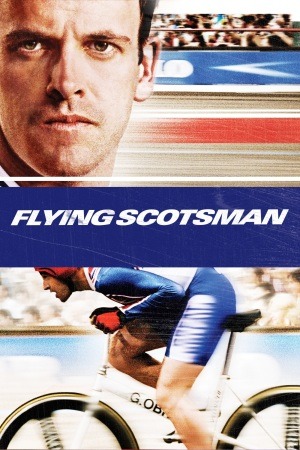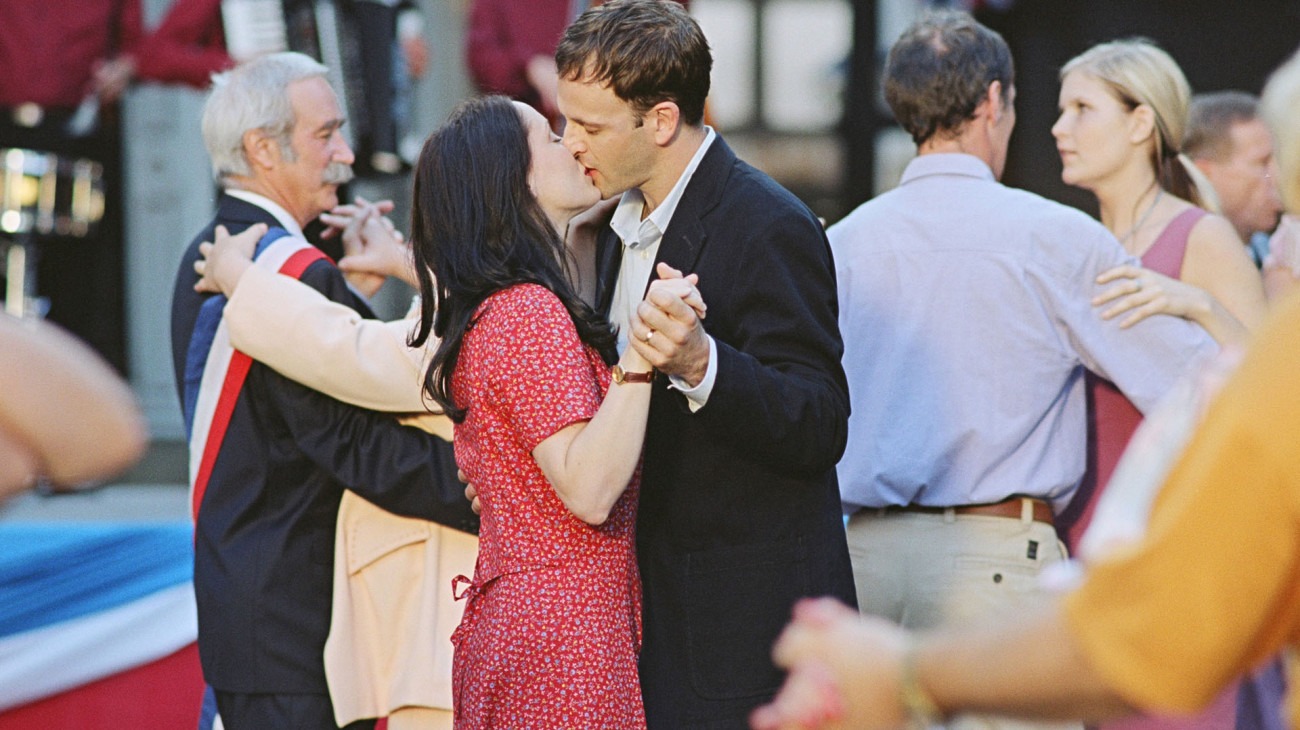
I want to ride my bicycle
It's not at all a great film, but in one respect at least I feel the need to salute the makers of The Flying Scotsman for doing something that I've never seen a movie do before: combine the inspirational underdog sports movie with a fairly honest (for the movies) and kind of unpleasant exploration of depression.
The film is based with unusual fidelity - meaning, most of the things that you'd assume were invented actually happened - on the life of Graeme Obree (Johnny Lee Miller), a weird little cycling obsessive who made a bit of a name for himself in competitive biking, fell into a joyless life of parcel delivery, decided to build the greatest speed-bike in history, thereupon setting the one-hour distance record (twice) and winning two international championships in 1993 and 1995. Meanwhile, he frequently entertained thoughts of killing himself.
That's a really striking contrast, and while I shouldn't be amazed that somebody felt that it would make a fine movie - success can't stop depression? Why, that's the very meat of biopics! - but I'm more than a little impressed that it's given any sort of space in a movie that otherwise feels a whole lot like any given true life sports story that's supposed to get us on our feet cheering.
It's this unwillingness to turn away from the minutiae of life that represents The Flying Scotsman's greatest strength as a story, but also its primary flaw. Obree's life, and I'm sure this didn't matter very much to him at the time, was marked by repetition on a grand level, for he suffered through essentially the same narrative arc three separate times: a dream of professional cycling success, followed by a quixotic attempt to achieve that success on his own highly individual terms, followed by success, followed by a peaceful decent into quiet domesticity. I'm not arguing that it's bad for life to go as it will, disregarding three-act structure, but this is a movie when all is said and done, and it is more specifically a movie whose entire second half is marked by a constant feeling of extreme familiarity.
Each arc of the film is interesting in its own way, mind you, and this is its own sort of victory: Obree's sport was played on empty indoor tracks without an audience, and watching a man ride a bike very fast around a big oval is about as exciting as it sounds. So congratulations are due to director Douglas Mackinnon for figuring out how to shoot this sport in a fairly exciting way, alternating shots of Obree's ever-more-flushed face with images of landscape speeding by very quickly. The ranks of top-tier bicycling movies are small indeed, and after a fashion The Flying Scotsman is a masterpiece of its genre, although it succeeds in that respect mostly just by showing up.
Mackinnon isn't so great outside of the velodrome, unfortunately. Working from a committee-drawn script that pays a little bit too much attention to what happens in the protagonist's life and perhaps not enough to why, Mackinnon doesn't seem terribly interested in dramatising Obree's mental disintegration, or perhaps he's just not very good at it; but all of the domestic sequences are shot with the imagination of a TV movie (and look where Mackinnon got his training! How 'bout that!), albeit one with grimy Scottish exteriors and under-lit interiors.
So hooray for the actors, who step up to the plate in a big way. Miller (of Trainspotting and Dracula 2000, and I shall let the reader choose which of those to dwell on) is in just about every scene of the film, and it's do almost entirely to his grasp of the character that Obree's depression works instead of coming off like a grim bit of window-dressing. Obree could have been any cookie-cutter sports hero, but Miller gets to the core of his narrow world, doubtlessly helped by the real Obree's on-set presence, and opens up his suffering to the audience, making this quite possibly one of the finest cinematic depictions of the disease that I've ever seen.
The supporting cast is all very good, particularly Laura Fraser as Obree's wife Anne and the stalwart Brian Cox as the pleasant old man who supports Obree in the building of his ramshackle bike "Old Faithful." Billy Boyd is on hand to do what he does in British movies, which consists of "Hey Americans! This guy was in The Lord of the Rings! Don't you just want to see the hell out of this movie now?" (I tease, I enjoy Billy Boyd just fine).
Overall, the film's not a washout, and it's not great, it's just kind of business-as-usual for a sports movie. That's not the worst thing in the world, but it ends up being a sleepy and forgettable affair. The actors are not forgettable. They are miraculous, full human beings. They make this typical movie into a reasonably affecting tale of human suffering.
And yet, I don't want to over-emphasise that point, because Obree's life was still more full than the movie credits, and this is most clear in the unexpected 1994 death of his brother, the event that triggered his worst bouts of depression and led to his suicide attempts. It's an idiotic omission, and one that doesn't make much sense: yes, it's a downer, but how much further down can a movie go once it opens with the hero trying to hang himself?
6/10
The film is based with unusual fidelity - meaning, most of the things that you'd assume were invented actually happened - on the life of Graeme Obree (Johnny Lee Miller), a weird little cycling obsessive who made a bit of a name for himself in competitive biking, fell into a joyless life of parcel delivery, decided to build the greatest speed-bike in history, thereupon setting the one-hour distance record (twice) and winning two international championships in 1993 and 1995. Meanwhile, he frequently entertained thoughts of killing himself.
That's a really striking contrast, and while I shouldn't be amazed that somebody felt that it would make a fine movie - success can't stop depression? Why, that's the very meat of biopics! - but I'm more than a little impressed that it's given any sort of space in a movie that otherwise feels a whole lot like any given true life sports story that's supposed to get us on our feet cheering.
It's this unwillingness to turn away from the minutiae of life that represents The Flying Scotsman's greatest strength as a story, but also its primary flaw. Obree's life, and I'm sure this didn't matter very much to him at the time, was marked by repetition on a grand level, for he suffered through essentially the same narrative arc three separate times: a dream of professional cycling success, followed by a quixotic attempt to achieve that success on his own highly individual terms, followed by success, followed by a peaceful decent into quiet domesticity. I'm not arguing that it's bad for life to go as it will, disregarding three-act structure, but this is a movie when all is said and done, and it is more specifically a movie whose entire second half is marked by a constant feeling of extreme familiarity.
Each arc of the film is interesting in its own way, mind you, and this is its own sort of victory: Obree's sport was played on empty indoor tracks without an audience, and watching a man ride a bike very fast around a big oval is about as exciting as it sounds. So congratulations are due to director Douglas Mackinnon for figuring out how to shoot this sport in a fairly exciting way, alternating shots of Obree's ever-more-flushed face with images of landscape speeding by very quickly. The ranks of top-tier bicycling movies are small indeed, and after a fashion The Flying Scotsman is a masterpiece of its genre, although it succeeds in that respect mostly just by showing up.
Mackinnon isn't so great outside of the velodrome, unfortunately. Working from a committee-drawn script that pays a little bit too much attention to what happens in the protagonist's life and perhaps not enough to why, Mackinnon doesn't seem terribly interested in dramatising Obree's mental disintegration, or perhaps he's just not very good at it; but all of the domestic sequences are shot with the imagination of a TV movie (and look where Mackinnon got his training! How 'bout that!), albeit one with grimy Scottish exteriors and under-lit interiors.
So hooray for the actors, who step up to the plate in a big way. Miller (of Trainspotting and Dracula 2000, and I shall let the reader choose which of those to dwell on) is in just about every scene of the film, and it's do almost entirely to his grasp of the character that Obree's depression works instead of coming off like a grim bit of window-dressing. Obree could have been any cookie-cutter sports hero, but Miller gets to the core of his narrow world, doubtlessly helped by the real Obree's on-set presence, and opens up his suffering to the audience, making this quite possibly one of the finest cinematic depictions of the disease that I've ever seen.
The supporting cast is all very good, particularly Laura Fraser as Obree's wife Anne and the stalwart Brian Cox as the pleasant old man who supports Obree in the building of his ramshackle bike "Old Faithful." Billy Boyd is on hand to do what he does in British movies, which consists of "Hey Americans! This guy was in The Lord of the Rings! Don't you just want to see the hell out of this movie now?" (I tease, I enjoy Billy Boyd just fine).
Overall, the film's not a washout, and it's not great, it's just kind of business-as-usual for a sports movie. That's not the worst thing in the world, but it ends up being a sleepy and forgettable affair. The actors are not forgettable. They are miraculous, full human beings. They make this typical movie into a reasonably affecting tale of human suffering.
And yet, I don't want to over-emphasise that point, because Obree's life was still more full than the movie credits, and this is most clear in the unexpected 1994 death of his brother, the event that triggered his worst bouts of depression and led to his suicide attempts. It's an idiotic omission, and one that doesn't make much sense: yes, it's a downer, but how much further down can a movie go once it opens with the hero trying to hang himself?
6/10
Categories: british cinema, sports films






